
Reconstruction to the Great Depression. Created by Sal Khan.
- Subject:
- History
- U.S. History
- Material Type:
- Lesson
- Provider:
- Khan Academy
- Provider Set:
- Khan Academy
- Author:
- Sal Khan
- Date Added:
- 06/01/2012

Reconstruction to the Great Depression. Created by Sal Khan.
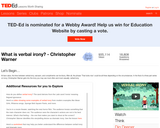
At face value, the lines between verbal irony, sarcasm, and compliments can be blurry. After all, the phrase 'That looks nice' could be all three depending on the circumstances. In the final of a three part series on irony, Christopher Warner gets into the irony you may use most often and most casually: verbal irony.

Lesson OverviewThis is a close reading lesson of “Little Things Are Big” by Jesús Colón . This text was featured in a newspaper column written in the 1950s. The essay is an introduction to the concepts of conflict in literature.Lesson FocusHow do the perceptions we have of ourselves and of others create conflicts?Student OutcomesStudents will be able to determine how the conflict in “Little Things Are Big” was influenced by outward (physical) identifiers as well as infer how the conflict may have been different if the main character would have made a different choice. Image source: "Menschen, Offentliche..." by Tim Savage on Pexels.com.

Investigate the effect of gravity on objects of various mass during free fall. Predict what the position-time and velocity-time graphs will look like. Compare graphs for light and heavy objects.
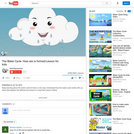
This video talks about the different steps in the water cycle.
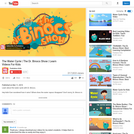
Animated video of the different parts of the water cycle. Also includes some additional terms related to the water cycle.
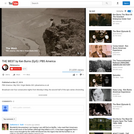
The Settlement of the West

Science expert Emerald Robinson explains what an ecosystem is and why they are important

Type is everywhere. Every print publication, website, movie, advertisement and public message involves the creation or selection of a fitting typeface. Online, a rich and artistic typographical culture exists, where typefaces are created and graphic design seeps in to every image.

Ever wondered what's inside a Wasp Nest? We cut this GIANT one in half!! Crazy!
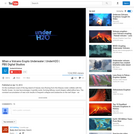
A video of an underwater volcano erupting

Students will watch a video of a storyteller coming up with a rap that tells a story. They will identify story elements (who, what, and where), and record significant details. The next lesson plan ,Using Story Elements to Write a Rap, has students creating their own rap with the story elements.

Oral poetry--rapper poet Prince Ea talks about the pain and division in our world and that the answer is love. Great journal prompt to get kids thinking about social justice, problems in the world they would like to address, or reflective writing about their own struggles.
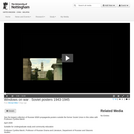
See the largest collection of Russian WWII propaganda posters outside the former Soviet Union in this video with Professor Cynthia Marsh
April 2009
Suitable for Undergraduate study and community education
Professor Cynthia Marsh, Professor of Russian Drama and Literature, Department of Russian and Slavonic Studies
Professor Cynthia Marsh began the study of Russian after leaving school, by taking an intensive course to A-level at the then Holborn College of Law, Languages and Commerce, in Central London. She then went on to gain BA hons Russian (first class) at the University of Nottingham and spent a year at the School of Slavonic and East European Studies, University of London, completing an MA Area Studies: Russia, before going on to full time research there on the relationship between poetry and painting in the work of the Russian poet Max Voloshin. This research culminated in a PhD, entitled M.A.Voloshin: Artist-Poet: A investigation into the synaesthetic aspects of his poetry (awarded in 1979.)
In 1972, after teaching Russian literature part-time on the University of London External BA honours course at Holborn, Professor Cynthia Marsh was appointed as a lecturer at Nottingham, and subsequently appointed senior lecturer and then Professor of Russian Drama and Literature. She served as head of department of Russian and Slavonic Studies from 2005-2006, and then from 2007- 2009.
In 2002 she was awarded a Lord Dearing Award for Outstanding Teaching by the University and subsequently became a Member of the Higher Education Academy. She currently teaches modules on Russian theatre and Russian drama and her research interests continue to focus on Russian theatre, publishing mainly on Chekhov and Gorky.